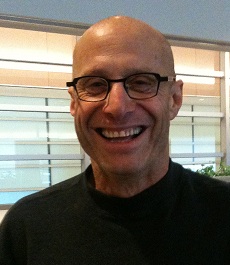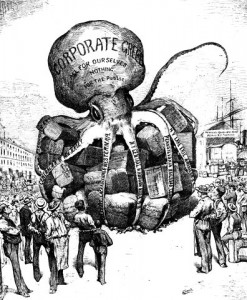MARK: First off, can you tell us a little about BALLE, and why it is that you think the work of the organization is so important at this point in American history?
PAUL: BALLE is the only national business alliance dedicated to connecting local, independent businesses to each other. That means the collective wisdom and knowledge about crowdfunding in Arizona is quickly and easily accessible by their business peers in Detroit, and that cross-pollination is proving to be a massive catalyst in moving the Localist movement to the forefront of policy and mainstream awareness.
MARK: In a few weeks, BALLE is holding its annual conference in Grand Rapids. Why Grand Rapids? Or, if I can put you on the spot… Why not Detroit, which seems like ground zero when it comes to this kind of thing?
PAUL: We have historically partnered to put on the conference with an established local BALLE network such that we can showcase their local living economy impacts up-close and personal. There is wonderful work happening in Detroit right now, which is why we have a post-conference tour of Detroit and a Michigan-specific scholarship fund recruiting Detroit (and other Michigan) leaders to come to the conference to share and to learn. But Local First in Grand Rapids is a national powerhouse network whose work is an example around the country. The collaborative work of the 600 members of Local First has proven that even the forces of recession and industrial decline are no match for the economic power of a thriving community of innovative locally owned businesses. By having the conference in Grand Rapids we’ll all get to experience that — to touch, smell, taste what real prosperity can look like in this former Rust Belt city.
MARK: Nationally speaking, when it comes to matters of local food production, and the evolution of complex, dynamic local business ecosystems, like those championed by BALLE, would you say that Michigan is in front of the curve, leading the way?
PAUL: I really don’t feel qualified to answer this. Maybe Rodger Bowser, one of the Deli’s managing partners, who is very connected with this scene would be a better person to weigh in on this question.
MARK: As I know that you spend a lot of time traveling the country, I’m wondering what areas you feel we have the most to learn from. I hear a lot, for instance, about the Intervale Food Hub in Vermont. What, if anything, can we learn from them? And what other regions can we appropriate ideas from?
PAUL: Regarding Intervale, I’d point here to the “Community Food Enterprise” study from 2 years ago, undertaken by BALLE and the Wallace Center at Winrock International, that profiled Intervale and other local and regional food businesses for what they have to teach other communities. See the Intervale case study online here. Intervale’s work is powerful because it took underutilized land and a dream of a city to meet 10% of its food demand through local production, and it accomplished this by creating and bringing together a whole range of locally owned, community-serving businesses that worked collaboratively to build a local food system specific to the needs and assets of Burlington.
Farmer training and support was one key component of their success, as with another model we profiled, Appalachian Harvest Network, taking former tobacco farmers and training them instead to become organic food growers for local and regional consumption. It’s an unlikely story but it’s been a big success in terms of local food access and rural economic development.
For those interested in food hubs, we’ll have a 2-hour interactive session dedicated to the topic at the BALLE conference in Grand Rapids.
MARK: Speaking of food hubs, how are things going with our local initiative? Is there any positive news to report?
PAUL: Again, talk to Rodger Bowser.
MARK: This may be a bit of an oversimplification, but we know from experience that chain stores, on the whole, are like a cancer. They force locally-owned retailers out of business. They tend to pay people poorly. They siphon money out of the communities the inhabit. And, ultimately, they have no allegiance to these communities in which they exist. They aren’t accountable. And, at the first sign of trouble, they pull up stakes and leave, after having decimated finely-tuned ecosystems that took decades to form. But, they’re efficient as all hell, and they provide goods and services at relatively affordable prices, which is important to today’s cash-strapped and financially insecure American consumer. Given that dynamic, how does one move forward? Clearly, as in the case of Zingerman’s, there’s a certain demographic that’s willing to pay for quality product. They’re going to pay a premium, knowing that the company they’re choosing to do business with, is paying a living wage, treating their people well, and contributing toward the betterment of their community. And that, in and of itself, is a good thing. But how do you broaden that audience? How do you move the line so that would-be Walmart shoppers start going to the local woodworker for their picnic tables, or the local butcher for their hamburger, when, I think it’s safe to say, those folks are never going to be able to compete on price? How do you make people value quality, and the acknowledge the fact that spending more to do business with a neighbor is actually in their best interest?
 PAUL: We’ve all felt the very real and personal impact of what it means to be at the mercy of global conglomerations. We’ve seen them pack up and leave, and that has left many out of work for the first time in their lives. The local treasury has been bled, the community’s standard of living has been lowered, and, in some instances, the earth has been scorched. Consider the dollars staying in a community at your local butcher, how that helps pay local taxes, which help local schools, and keeps wages higher so that the people who live and work in your town are also shopping and spending and keeping your local economy humming along – that is real prosperity. It’s certainly an education process, and we’ve got a long ways to go, but the current love-affair with “buy local” is paving the way for us to have the broader conversation. We can then begin to have dialogue and education on what “the true cost of a product” is, in terms of people and planet.
PAUL: We’ve all felt the very real and personal impact of what it means to be at the mercy of global conglomerations. We’ve seen them pack up and leave, and that has left many out of work for the first time in their lives. The local treasury has been bled, the community’s standard of living has been lowered, and, in some instances, the earth has been scorched. Consider the dollars staying in a community at your local butcher, how that helps pay local taxes, which help local schools, and keeps wages higher so that the people who live and work in your town are also shopping and spending and keeping your local economy humming along – that is real prosperity. It’s certainly an education process, and we’ve got a long ways to go, but the current love-affair with “buy local” is paving the way for us to have the broader conversation. We can then begin to have dialogue and education on what “the true cost of a product” is, in terms of people and planet.
MARK: I’m curious to know what you make of American Express’s well-financed, annual Small Business Saturday campaign. I’m torn. On one hand, I think it’s good that they’re giving national exposure to the importance of locally-owned business, but, on the other, it’s just one damned day. And it kind of feels, at least to me, like the movement is getting co-opted. Are you sensing that the “buy local” movement is at risk of being taken over? I mean we have malls now with signs saying “Buy Local.” How do we keep the waters from getting muddied, and the whole thing becoming meaningless?
PAUL: This is an interesting question. American Express asked for BALLE’s endorsement of the day, and after a lot of discussion with American Express representatives and our community, we decided not to. Certainly, they have reached a very large national audience with their Small Business Saturday campaign, and it does get people talking about small business, if not local and independent ownership. What we think is most important is to help the public connect this one day to the work happening on Main Streets around the country to support independent businesses throughout the year. Several dozen local business networks came together to create the Shift Your Shopping holiday campaign as our movement’s answer — a campaign that represented more than 38,000 businesses across the U.S. and Canada. You can find out more about that campaign here.
MARK: If I could take the opportunity to ask you an Ypsi specific question…. As you and I have discussed before, a great many Zingerman’s employees live in Ypsilanti. (I believe more than half, right?) While I know that there’s some synergy to be had, having all of your various enterprises co-located in Ann Arbor, might it make sense, at some point, to put some portion of your business in Ypsi? I know that it would be difficult to decouple the Bakehouse from Zingerman’s Mail Order, for instance, but I think that it would be awesome if you did your baking here… maybe on Water Street.
PAUL: It would actually be easier and more realistic to move our Mail Order operation to Ypsi, and that is a possibility. I still would really like to have a Zingerman’s presence in Ypsilanti and I believe that it will happen at some point. Although I do worry about being viewed as an unwanted outsider.
MARK: Back to chains, I’m curious what you think about legislation that would restrict their growth in, for instance, downtown areas. Is that something that we might want to consider in Ann Arbor, where, at the rate we’re going, over half of all storefronts will be either a 7 Elevens or a Starbucks by 2020.
PAUL: Many cities have experimented with ways to lift up their locally owned independents and define for themselves what they want their business community to look like. Some of those efforts have been more successful than others. For example, Think Local First DC and Go Local Tacoma (Washington State) are two BALLE networks that have been navigating Walmart coming to town, and Local First Arizona completed several landmark studies that have changed Phoenix procurement policies to support local businesses first. The ongoing research of Michael Shuman, a BALLE Fellow, and Stacy Mitchell, of the Institute for Local Self Reliance, are some of the most helpful resources about what’s been tried and what’s worked. You can find details here.
MARK: What are you most looking forward to at the BALLE conference?
PAUL: Hanging out with Mark Maynard. Having people from around the country coming to a city that Time magazine called “DEAD” and seeing how vibrant it is and also experiencing all the great, positive energy that is Michigan (irrespective of the legislature in Lansing). I always get re-energized with hope when I get to see and hear about all the people who don’t sit around complaining about what is wrong, but instead are imagining and acting on what is possible.
MARK: Is there anything else that I should have asked?
PAUL: What does BALLE mean when it talks about Real Prosperity vs False Prosperity?
False Prosperity
Consolidated, distant ownership
Benefiting only a few
Depleting natural resources
Dependent, volatile
Homogenizing, loss of heritage
Dollars leave the local economy
Real Prosperity
Diverse, local ownership
Improving quality of life for all
Protecting the natural resources we all need
Self-sufficient, resilient
Unique culture, pride of place
Dollars stay in local economy
Those interested in joining me and Paul at the BALLE conference in Grand Rapids, will find registration information here… Also, I’ve just been informed that the Kellogg Foundation has come forward with a generous offer to fund 25 scholarships to the conference. According to the announcement, these scholarships are intended especially for “entrepreneurs and community network leaders from underrepresented communities in the Upper Peninsula, Detroit, Flint, Grand Rapids, and Muskegon, and beyond, including communities of color, low-income communities, and women-led organizations.” (I imagine that Ypsilanti would meet their criteria.) If you’d like to apply, you can find the online application here.
 I wanted to thank all of you who voted for me in the competition to win a scholarship to this summer’s Netroots Nation convention in Rhode Island. Thanks to your support (and the fact that I have a somewhat compelling blog), I’ve managed to secure one of the slots. I found out a couple of days ago, but I wanted to wait a bit before telling you, just in case it fell through, or, worse yet, I found out that someone had just been pulling my leg. Well, we had the big conference call with the Executive Director of Democracy for America last night, and, as everything seems legit, I thought that I’d go ahead and mention it. I seriously appreciate your support, and I hope to come back from Rhode Island with renewed enthusiasm for the work we have before us, and new ideas as to how, through this blog, I might be able to better contribute toward the positive change we so desperately need in Michigan. So, stay tuned.
I wanted to thank all of you who voted for me in the competition to win a scholarship to this summer’s Netroots Nation convention in Rhode Island. Thanks to your support (and the fact that I have a somewhat compelling blog), I’ve managed to secure one of the slots. I found out a couple of days ago, but I wanted to wait a bit before telling you, just in case it fell through, or, worse yet, I found out that someone had just been pulling my leg. Well, we had the big conference call with the Executive Director of Democracy for America last night, and, as everything seems legit, I thought that I’d go ahead and mention it. I seriously appreciate your support, and I hope to come back from Rhode Island with renewed enthusiasm for the work we have before us, and new ideas as to how, through this blog, I might be able to better contribute toward the positive change we so desperately need in Michigan. So, stay tuned.
 Why is it that we allow the Republicans to refer to themselves as the anti-tax party, when they keep demonstrating that they clearly aren’t? Sure, they’re all for the cutting of business taxes, inheritance taxes, and other taxes that would threaten to decrease the wealth of their party’s high-net-worth donors, but, invariably, those shifts in tax policy lead to higher taxes for everyone else. Elsewhere around the United States, the shift may not be as plainly visible, but, here, in Michigan, it’s painfully obvious to all but the most delusional among us. As
Why is it that we allow the Republicans to refer to themselves as the anti-tax party, when they keep demonstrating that they clearly aren’t? Sure, they’re all for the cutting of business taxes, inheritance taxes, and other taxes that would threaten to decrease the wealth of their party’s high-net-worth donors, but, invariably, those shifts in tax policy lead to higher taxes for everyone else. Elsewhere around the United States, the shift may not be as plainly visible, but, here, in Michigan, it’s painfully obvious to all but the most delusional among us. As 
 PAUL: We’ve all felt the very real and personal impact of what it means to be at the mercy of global conglomerations. We’ve seen them pack up and leave, and that has left many out of work for the first time in their lives. The local treasury has been bled, the community’s standard of living has been lowered, and, in some instances, the earth has been scorched. Consider the dollars staying in a community at your local butcher, how that helps pay local taxes, which help local schools, and keeps wages higher so that the people who live and work in your town are also shopping and spending and keeping your local economy humming along – that is real prosperity. It’s certainly an education process, and we’ve got a long ways to go, but the current love-affair with “buy local” is paving the way for us to have the broader conversation. We can then begin to have dialogue and education on what “the true cost of a product” is, in terms of people and planet.
PAUL: We’ve all felt the very real and personal impact of what it means to be at the mercy of global conglomerations. We’ve seen them pack up and leave, and that has left many out of work for the first time in their lives. The local treasury has been bled, the community’s standard of living has been lowered, and, in some instances, the earth has been scorched. Consider the dollars staying in a community at your local butcher, how that helps pay local taxes, which help local schools, and keeps wages higher so that the people who live and work in your town are also shopping and spending and keeping your local economy humming along – that is real prosperity. It’s certainly an education process, and we’ve got a long ways to go, but the current love-affair with “buy local” is paving the way for us to have the broader conversation. We can then begin to have dialogue and education on what “the true cost of a product” is, in terms of people and planet.









